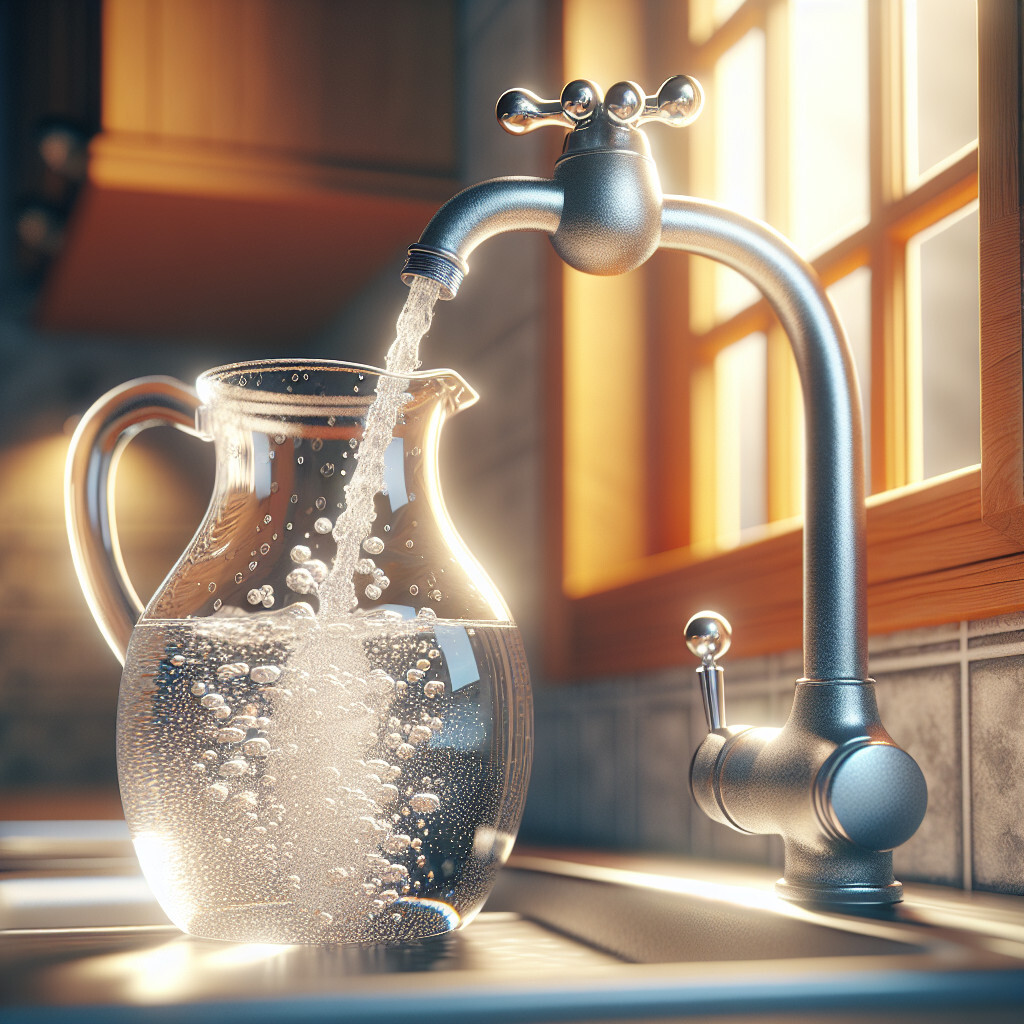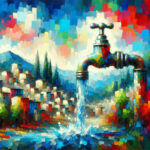-
Table of Contents
“Andorra’s Tap Water: Pristine, Pure, and Perfectly Drinkable!”
Introduction

Andorra, a small country nestled in the Pyrenees mountains between France and Spain, is known for its high-quality tap water. The water is sourced from natural springs and is treated to meet the highest international standards, making it safe and healthy to drink. The purity of the water is often attributed to the country’s pristine environment and strict water management policies.
Understanding the Quality of Tap Water in Andorra
Andorra, a small, picturesque country nestled in the Pyrenees mountains between France and Spain, is renowned for its stunning natural beauty. However, one aspect of this nation that often goes unnoticed is the quality of its tap water. The tap water in Andorra is not only safe to drink but is also considered to be of exceptional quality. This article aims to provide an in-depth understanding of the quality of tap water in Andorra.
The quality of tap water can be determined by several factors, including its source, the treatment process it undergoes, and the infrastructure used to deliver it. In Andorra, the primary source of tap water is the abundant mountain springs. The water from these springs is naturally filtered through layers of rock, which helps to remove impurities and contributes to its high quality. Moreover, the country’s high altitude and low pollution levels further ensure that the water remains uncontaminated.
However, the natural filtration process is not solely responsible for the excellent quality of Andorra’s tap water. The country also has a robust water treatment system in place. The water undergoes rigorous testing and treatment to eliminate any potential contaminants, such as bacteria, viruses, and harmful chemicals. This process ensures that the water meets the stringent safety standards set by the World Health Organization.
The infrastructure used to deliver the water also plays a crucial role in maintaining its quality. Andorra has invested heavily in its water infrastructure, ensuring that the water remains clean and safe as it travels from the source to the tap. The country’s water supply system is regularly inspected and maintained to prevent any potential contamination.
Despite the high quality of Andorra’s tap water, it is still recommended to use a water filter, especially for those with sensitive stomachs or specific dietary requirements. While the water is generally safe to drink, a filter can help to remove any remaining impurities and improve the taste. It’s also worth noting that the hardness of the water can vary across the country, which can affect its taste and the amount of limescale it leaves behind.
In conclusion, the tap water in Andorra is of exceptional quality, thanks to the country’s abundant mountain springs, rigorous water treatment processes, and well-maintained water infrastructure. However, using a water filter can further enhance the quality and taste of the water. So, whether you’re a resident or a visitor, you can confidently drink the tap water in Andorra, knowing that it is clean, safe, and of high quality.
The Process of Water Purification in Andorra: A Deep Dive
Andorra, a small, landlocked country nestled in the Pyrenees mountains between France and Spain, is renowned for its pristine natural environment. This includes its water resources, which are of exceptional quality. The tap water in Andorra is not only safe to drink but is also considered among the purest in the world. This is largely due to the country’s rigorous water purification process, which ensures that the water is free from harmful contaminants and meets the highest standards of quality.
The process of water purification in Andorra begins at the source. The country’s water supply primarily comes from natural springs and rivers, which are fed by the melting snow from the Pyrenees mountains. This water is already relatively pure due to the absence of industrial pollution in the region. However, it still undergoes a comprehensive treatment process to remove any potential impurities and ensure its safety for consumption.
The first step in this process is coagulation and flocculation, where chemicals are added to the water to bind together the small particles of dirt and other impurities into larger clumps, or ‘flocs’. These flocs are then easily removed in the next stage, sedimentation, where the water is left to stand and the flocs sink to the bottom due to their increased weight.
Following sedimentation, the water undergoes filtration, which removes any remaining particles. This is typically achieved using layers of sand, gravel, and charcoal, which act as natural filters. The water slowly trickles down through these layers, leaving behind any impurities.
The final step in the purification process is disinfection. This is crucial for killing any remaining bacteria, viruses, or other microorganisms that could pose a risk to human health. In Andorra, this is typically achieved using chlorine, which is highly effective at eliminating these pathogens.
Once the water has been treated, it is rigorously tested to ensure it meets the stringent quality standards set by the Andorran government. These standards are based on those set by the World Health Organization and include limits for various chemical and microbiological contaminants. Only when the water has passed these tests is it deemed safe for consumption and distributed to homes and businesses across the country.
The tap water in Andorra is not only safe to drink but is also highly palatable, with many residents and visitors commenting on its fresh, clean taste. This is a testament to the effectiveness of the country’s water purification process, which ensures the water is free from any unpleasant tastes or odors.
In conclusion, the tap water in Andorra is of exceptional quality, thanks to the country’s rigorous water purification process. This process, which includes coagulation, sedimentation, filtration, and disinfection, ensures that the water is free from harmful contaminants and meets the highest standards of safety and taste. So, whether you’re a resident of Andorra or a visitor to this beautiful country, you can feel confident in the safety and quality of the tap water.
Health Implications of Drinking Tap Water in Andorra
Andorra, a small principality nestled in the Pyrenees between France and Spain, is renowned for its pristine natural environment. This includes its water sources, which are primarily derived from the mountainous terrain that surrounds the country. The tap water in Andorra is generally considered safe to drink, but like any water source, it is not entirely free from potential health implications.
The quality of tap water can vary greatly depending on a multitude of factors, including the source of the water, the treatment process it undergoes, and the condition of the infrastructure used to deliver it. In Andorra, the tap water is sourced from natural springs and reservoirs in the mountains. This water is then treated and purified to ensure it meets the stringent health and safety standards set by the Andorran government and the World Health Organization.
One of the primary health implications associated with drinking tap water in any location is the potential presence of contaminants. These can range from naturally occurring minerals and bacteria to man-made pollutants and chemicals. In Andorra, the risk of contamination is relatively low due to the country’s isolated location and strict water treatment processes. However, it is not entirely non-existent. For instance, the tap water in Andorra has been found to contain trace amounts of minerals such as calcium and magnesium. While these minerals are not harmful in small quantities, excessive consumption can lead to health issues such as kidney stones.
Another potential health implication of drinking tap water in Andorra is the risk of bacterial contamination. This is a common concern with any water source, particularly in areas where the water is sourced from natural springs or reservoirs. In Andorra, the water treatment process includes disinfection to kill any harmful bacteria, but there is always a small risk that some bacteria may survive. This risk is increased if there are issues with the water infrastructure, such as leaks or breaks in the pipes, which can allow bacteria to enter the water supply.
Despite these potential health implications, the tap water in Andorra is generally considered safe to drink. The Andorran government conducts regular testing to ensure the water meets health and safety standards, and any issues are quickly addressed. Furthermore, the country’s high altitude and cold climate help to naturally purify the water, reducing the risk of contamination.
However, it is always advisable for individuals, particularly those with sensitive stomachs or weakened immune systems, to take precautions when drinking tap water in a new location. This can include using a water filter or drinking bottled water. It is also important to remember that the quality of tap water can vary between different areas within the same country, so it is always a good idea to check the local water quality reports.
In conclusion, while the tap water in Andorra is generally safe to drink, there are potential health implications associated with drinking any tap water. These include the risk of mineral and bacterial contamination. However, these risks are relatively low in Andorra due to the country’s stringent water treatment processes and natural purification methods. As always, individuals should take precautions and check local water quality reports when drinking tap water in a new location.
Environmental Impact on Andorra’s Tap Water Quality
Andorra, a small, landlocked country nestled in the Pyrenees mountains between France and Spain, is renowned for its pristine natural environment. This environmental purity extends to its tap water, which is considered among the cleanest and safest in the world. However, the quality of Andorra’s tap water is not merely a product of its geographical location; it is also a testament to the country’s commitment to environmental preservation and sustainable practices.
The quality of tap water in any region is largely determined by the state of its surrounding environment. In Andorra, the tap water originates from the country’s abundant mountain springs. These springs are fed by the melting snow and rainwater, which percolate through the mountainous terrain, undergoing a natural filtration process. This process removes impurities and enriches the water with essential minerals, resulting in tap water that is not only safe to drink but also beneficial for health.
However, the purity of these mountain springs, and consequently the quality of Andorra’s tap water, is contingent on the health of the Pyrenees’ ecosystem. Any environmental degradation, such as pollution or climate change-induced alterations, could potentially compromise the quality of the water. Recognizing this, Andorra has implemented stringent environmental policies to safeguard its natural resources.
One of the key measures taken by Andorra to protect its water quality is the strict regulation of industrial activities. The country has minimal industrialization, and the few industries that do exist are subject to rigorous environmental standards. This has effectively minimized the risk of water contamination from industrial pollutants.
Moreover, Andorra has made significant strides in waste management. The country has a comprehensive waste treatment system that ensures all waste is properly disposed of, preventing it from contaminating the water sources. Additionally, recycling is strongly encouraged and widely practiced among the population, further reducing the amount of waste that could potentially pollute the water.
Climate change poses another significant threat to Andorra’s water quality. Rising temperatures could disrupt the natural water cycle in the Pyrenees, affecting the quantity and quality of the water in the mountain springs. To mitigate this, Andorra has been proactive in its efforts to combat climate change. The country is a signatory to the Paris Agreement and has committed to reducing its greenhouse gas emissions. It has also invested in renewable energy sources, such as hydroelectric power, which not only reduces its carbon footprint but also harnesses its abundant water resources in a sustainable manner.
In conclusion, the exceptional quality of Andorra’s tap water is a reflection of the country’s pristine natural environment and its diligent efforts to preserve it. The country’s stringent environmental policies, effective waste management, and commitment to combating climate change have all contributed to maintaining the purity of its water sources. However, as environmental challenges continue to evolve, Andorra’s commitment to sustainability and preservation will be crucial in ensuring that its tap water remains among the cleanest in the world.
Q&A
1. Question: Is the tap water in Andorra safe to drink?
Answer: Yes, the tap water in Andorra is generally safe to drink.
2. Question: What is the quality of tap water in Andorra?
Answer: The quality of tap water in Andorra is high, as it comes from natural mountain springs.
3. Question: Do I need to boil tap water before drinking in Andorra?
Answer: No, it is not necessary to boil tap water in Andorra before drinking.
4. Question: Is bottled water better than tap water in Andorra?
Answer: Not necessarily, the tap water in Andorra is of high quality and safe to drink. However, some people may prefer bottled water due to personal preference.
Conclusion
The tap water in Andorra is generally safe and clean to drink due to the country’s high standards for water treatment and its natural mountain water sources.






